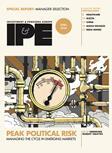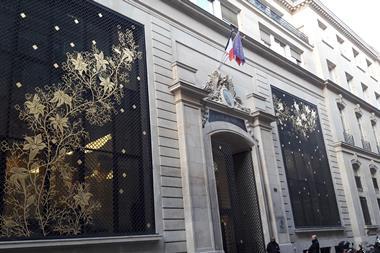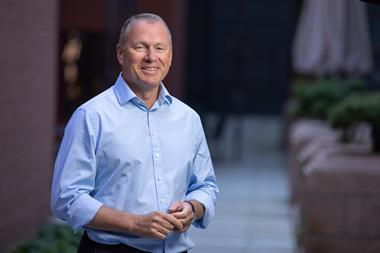One of Ireland's largest schemes prepares for the Euro -and other challenges. Fennell Betson reports
It has been a very busy 12 months indeed for those in charge of the Telecom Eireann (TE) pension fund. According to Kevin Conlon, who runs the scheme from the Superannuation Fund's offices in the splendour of Dublin's Merrion Square, it was the year when the scheme saw some of its most dramatic changes since its formation in 1984.
The fund started life when the Irish telephone service was hived off from the government department that ran it and the post office. Some 18,000 staff moved across from the civil servants' unfunded scheme into a new to-be funded arrangement, as the organisation metamorphosed into a corporate structure, though still completely state-owned.
Under the transfer arrangements , the Minister for Finance accepted that he would be liable for the pre-vesting portion of the pensions," he says. So the fund took over paying the pensions of those who had already retired from the department and of those who were assigned to the new company for their service both before and after that date. "In fact, from day one the fund was paying out pensions," he says.
But the Department of Finance did not reimburse it for these amounts at that time. "So the fund tracked the amounts being paid out on the minister's behalf. Following legal and actuarial advice, these amounts attracted the same return each year as was earned on the other invested assets of the fund." The amount grew over the years into a substantial sum and a significant portion of the funds assets, though the returns added were limited to fixed interest returns in 1994.
In the past four years, however, formal ar-rangements were put in hand after discussions between the fund, the company and the department, with the result that ministerial payments started in 1994. By the end of the financial year in April 1997, the amount outstanding had fallen to Ir£170m ($237.5m) from Ir£251m in the previous year, according to the fund's accounts. Interestingly, this amount was recorded here as 'self-investment'.
The prospect of the amount being cleared meant the fund's trustees could look ahead to the time when "the whole fund and structure could be reviewed as a unity", so an asset liability study was put in hand. The entire investment strategy was examined in the light of this.
At this point, the fund had a mix of three investment managers: Bank of Ireland (BIAM), AIB and New Ireland, each operating to much the same balanced mandate. As the review process got under way, an unexpected card was played, with the move by the Bank of Ireland to buy the New Ireland. This meant that the trustees had to consider the implications of the takeover for the fund. "Then in December last year, the exchequer paid off the entire balance and the interest outstanding," says Conlon. "So both of these factors drove the review process."
The first decision to emerge may well prove the most radical in the longer term. This was the ap-pointment of US manager Wellington to run a global equity mandate, thus marking a first turn to-wards a specialist brief and choosing a non-domestic manager - something which is unusual for an Irish fund that is a flagship within the state sector. "We took advice from the UK arm of our advisers Mercer in the selection process, which led to the appointment of Wellington."
For the rest of the portfolio, the trustees opted for a two pronged approach: "We replaced New Ireland with a balanced mandate with Ulster Bank Investment Managers and appointed Irish Life, with its indexed consensus managed fund approach."
Indirectly, the disappearance of the New Ireland also provided another opportunity - to recruit Ciarán Naughton as an investment specialist and actuary, who had been a fund manager there. He joined this year with the role of beefing up the fund's resources on the investment side, another indication of the increasing importance of the area in the trustees' eyes.
The Irish Life consensus account tracks an index linked to the returns achieved by the average of the returns obtained on managed pooled pension funds operated by Irish managers. "What this does is to smooth returns, as well as providing an excellent product to benchmark the other balanced managers," says Naughton. He regards the specialist global equity mandate as being very much a "toe in the water" for the fund. "We wanted a fresh look and new input," adds Conlon about the decision.
The mandates spread among the balanced managers are currently: Ir£450m with AIB, Ir£400m with BIAM, Ir£180m with Irish Life and Ir£170m with UBIM. The Wellington portfolio is Ir£50m.
Conlon says: "Property is another important component of our portfolio and here the trustees have decided to invest directly themselves. The amount invested is currently about Ir£40m and we want to increase this by a further Ir£25m. We have always looked at the property sector very seriously, but there has been a shortage of good opportunities. Our broad target is to have around 10% invested in property for reasons of diversification, which is not high by Irish standards. Many funds include property in their managers' balanced mandates." At the end of April, the break down of the fund was 66% in equities, with 27% in domestic, 25% in fixed interest (12% domestic) and 3% in property. In addition, there is a commitment to three venture capital funds investing in Irish businesses, but this does not amount to more than 1% of assets.
In line with others, the fund had a brilliant return of over 45% last year, which saw the assets soar to Ir£1.4bn, making it one of the largest in the country. In 1993, assets were some Ir£490m.
"Though our next actuarial review is not until 1999, we believe the fund must now be in a very healthy state and may well be in surplus. But we very much see ourselves in the long-haul business and what we gain in the good years has to provide for the bad years," says Conlon.
The previous actuarial review in 1996 was at the time of the 'Strategic Alliance' when two other telecom companies, KNP of the Netherlands and Sweden's Telia took a stake in TE. "These new shareholders were hugely interested in the stability and growth of the pension fund," Conlon recalls.
"The arrival of the euro is a very live issue with Ireland in the first wave of joiners," says Naughton. "At corporate level a lot of re-sources have been dedicated to have the company properly positioned and we are dovetailed into this." The fund administration is handled within the group, so the systems are being readied for both punts and euro denominations. "On the investment side, the issue is constantly under review and being discussed by the trustees and the managers. What we expect to see is a gradual reduction in Irish equities and a build up in European equities. But the time frame over which this happens remains to be seen - it could be five to 10 years."
He adds: "The case for European equities is considerably strengthened with liabilities soon to be denominated in euros. As a result, the case for a large exposure to Irish equities is less valid. This argument for diversifying overseas has been made easier by the considerable re-rating of Irish stocks, but it is not going to be a short, sharp change. As we have balanced mandates, this is very much the decision of the in-vestment managers, but the trustees are keeping a sharp eye on this issue and they quiz the managers each meeting on the area."
The fund is actively looking at the question of having global custodian, says Conlon. "We re-gard all aspects of the custodial process as being important from the information, the safekeeping, cost issues and the reduction of risk. Custodial issues are becoming very live and real, as funds look at their exposures in different parts of the world to make sure they are bedded down and secure."
In the years since the fund was started it has seen the active workforce in company drop from 18,000 to nearer 10,000, due to the relentless drive of technology in the telecoms business. With little new recruiting by the main company, the growth areas are in the subsidiary businesses such as mobile phones. Most of the positions here are on a contract basis, with defined contribution schemes in place run at subsidiary level. "In some ways, we are becoming a closed fund, particularly with the ongoing reduction in staff, "says Conlon.
And should the decision ultimately be taken to privatise TE, there is no doubt that the pension fund is now in very good shape to meet whatever challenges this may bring."












No comments yet